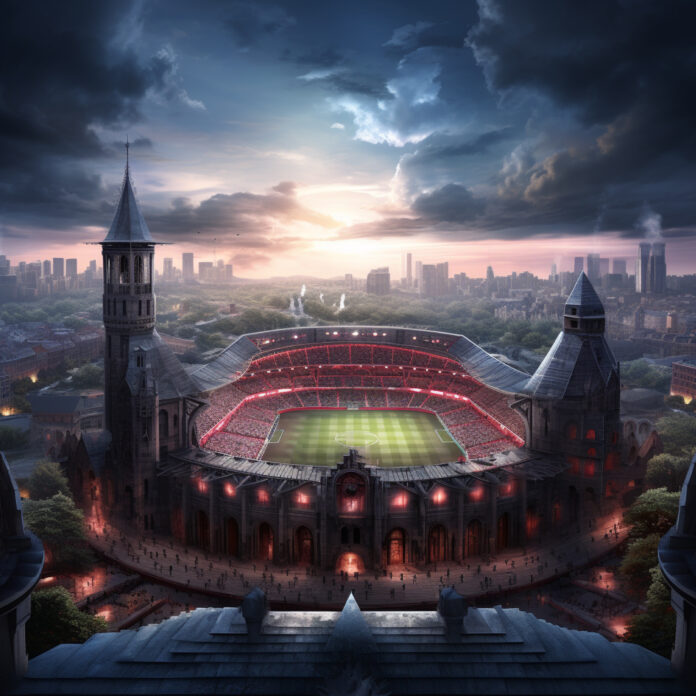Home football stadiums are extremely special places for fans of the club. They’re places of joy, excitement, tension, and lows, places that provide a rollercoaster of emotions, through good and bad times, and the love for the place never goes away.
However, today these places of sentiment are changing. With Everton’s brand new stadium expected to open next year and Manchester United’s Old Trafford in need of great repair, the sad fact is that these stadiums won’t last forever.
However, what if new stadiums added some completely new character to them, and used the inspirations of local architects for its design?
The team at SportsBoom.com have used AI to conceptualise and reimagine famous football stadiums if they were designed by local established architects.
1. Wrexham – Racecourse Ground (Benjamin Gummow)
Wrexham, a club that’s been stuck in the National League – the 5th tier of football – for over a decade, have had a magical few years.
After struggling for many years, Hollywood superstars Ryan Renolds and Rob McElhenney became the club’s new owners in 2020 after buying the club for just £2 million. Since then, the duo have managed to heighten the Welsh club to international fame.
The club have recently been promoted back into the football league, as they play in League Two this season, and the Disney+ documentary Welcome to Wrexham has sparked international interest in the club.
This reimagined Racecourse Ground is inspired by the work of Benjamin Gummow (1766 – 1840), an architect who worked from Ruabon near Wrexham in Wales. He designed various wings of Eaton Hall, and the stadium’s exterior follows the classic style of the hall, pictured below.
2. Liverpool – Anfield (Alfred Waterhouse)
Liverpool FC’s Anfield stadium needs no introduction, an absolute titan of English football stadiums holding up to 54,000 spectators per game.
Anfield is currently under expansion to seat 61,276, which will make it the fifth-largest football stadium in England.
It’s difficult to argue against Liverpool being one of the biggest teams in Europe, with countless domestic cups, Champions Leagues, and Premier League wins throughout their history.
This high-fantasy-looking reimagining of Anfield is inspired by the architecture of Alfred Waterhouse (1830 – 1905), a Liverpool-born architect known for his designs of Manchester Town Hall and the Natural History Museum in London.
3. Manchester City – Etihad Stadium (Ian Simpson)
This reimagining is of the Etihad Stadium in Manchester, the home of Manchester City, the treble winners of the 2022/23 season.
Since they were overtaken by Mansour bin Zayed, Manchester City have been domestic champions and now European champions, with their treble Premier League, FA Cup, and Champions League win last season.
Their Etihad Stadium has been reimagined as Ian Simpson architecture. Ian Simpson was born and brought up in Heywood, near Rochdale, known for buildings such as Urbis, Manchester – Beetham Tower, Manchester, and One Blackfriars, London.
If Simpson was responsible for the Etihad, it’d be structured with huge glass panels that would beautifully play with the light.
Credit: Michaelmazr
4. Barcelona – Camp Nou (Antoni Gaudi)
Another one of Europe’s biggest and most famous teams, Barcelona are one of the most successful teams in football.
Their iconic stadium, Camp Nou, is Europe’s largest with over 99,000 seats and is the stuff of legend when you think of the players and iconic matches that have been played there.
This reimagining of Camp Nou, now known as Spotify Camp Nou, makes the stadium like a stadium from the far future.
It’s based on the architecture of Antoni Gaudi (1852 – 1926), a famous Catalan architect, known as the greatest exponent of Catalan Modernism. Most of his architecture is located in Barcelona.
Credit: Thomas Ledl
credit to Sportsboom for the above article : https://www.sportsboom.com/
Help keep news FREE for our readers
Supporting your local community newspaper/online news outlet is crucial now more than ever. If you believe in independent journalism, then consider making a valuable contribution by making a one-time or monthly donation. We operate in rural areas where providing unbiased news can be challenging. Read More About Supporting The West Wales Chronicle






















